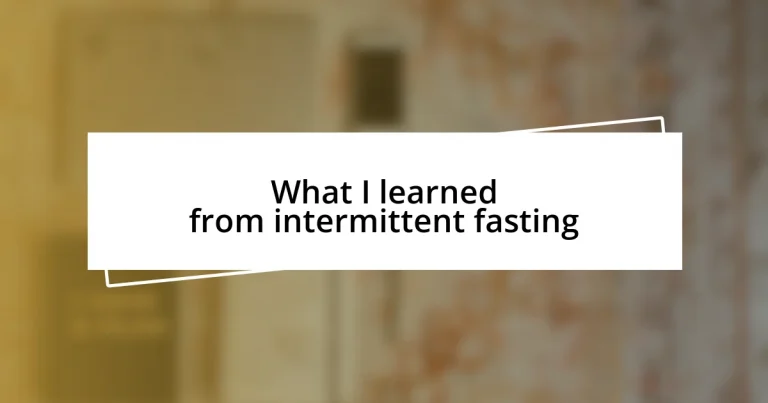Key takeaways:
- Intermittent fasting (IF) reshapes one’s relationship with food, promoting greater body awareness and healthier eating habits.
- Key benefits of IF include increased energy, improved mental clarity, and enhanced connection to physical hunger cues.
- Successful implementation of IF involves mindful eating, proper hydration, and strategic meal planning to avoid common pitfalls.
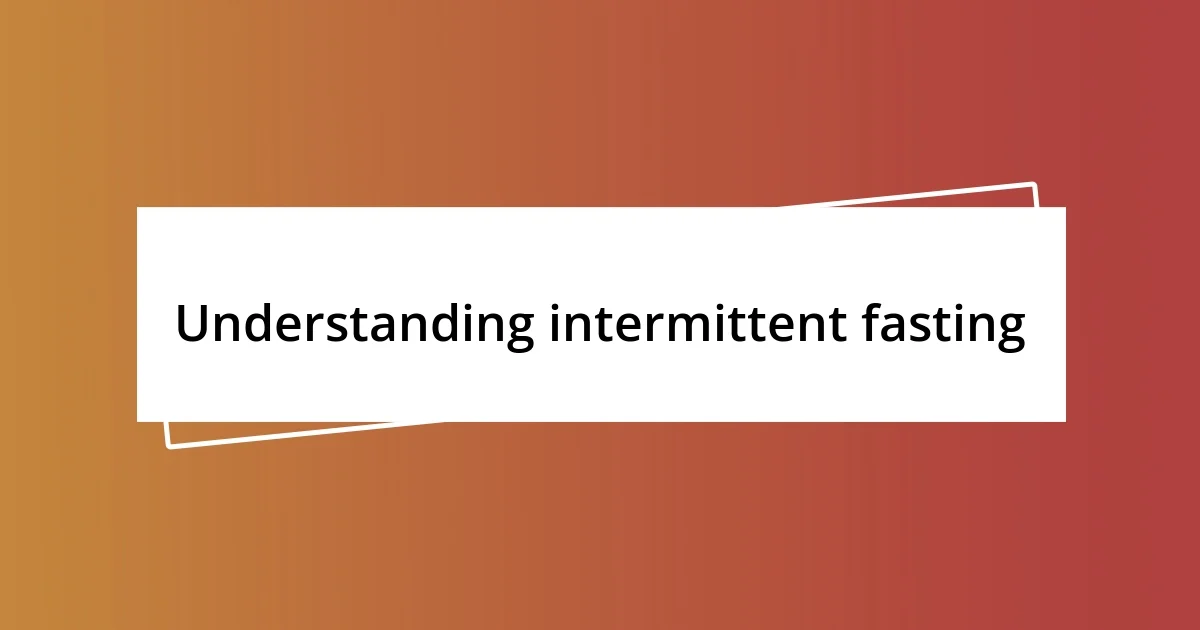
Understanding intermittent fasting
Intermittent fasting (IF) is more than just a diet; it’s a lifestyle choice that involves cycling between periods of eating and fasting. When I first delved into this, I was struck by how it challenged my relationship with food. Have you ever wondered if we eat out of habit rather than hunger? That realization hit me as I became more in tune with my body’s signals.
At first, I struggled during the fasting windows. I experienced moments of intense hunger that made me question my commitment. However, as time went on, I noticed something fascinating: my body began to adapt. I found clarity in those fasting periods, almost like a mental sharpening. Isn’t it interesting how our bodies can adjust when we give them the chance?
Understanding the science behind IF also played a crucial role in my journey. Research suggests that fasting may enhance metabolic health and promote cellular repair. Who wouldn’t want to harness that kind of potential? It’s empowering to think that something as simple as when you eat can have profound effects on your overall well-being.
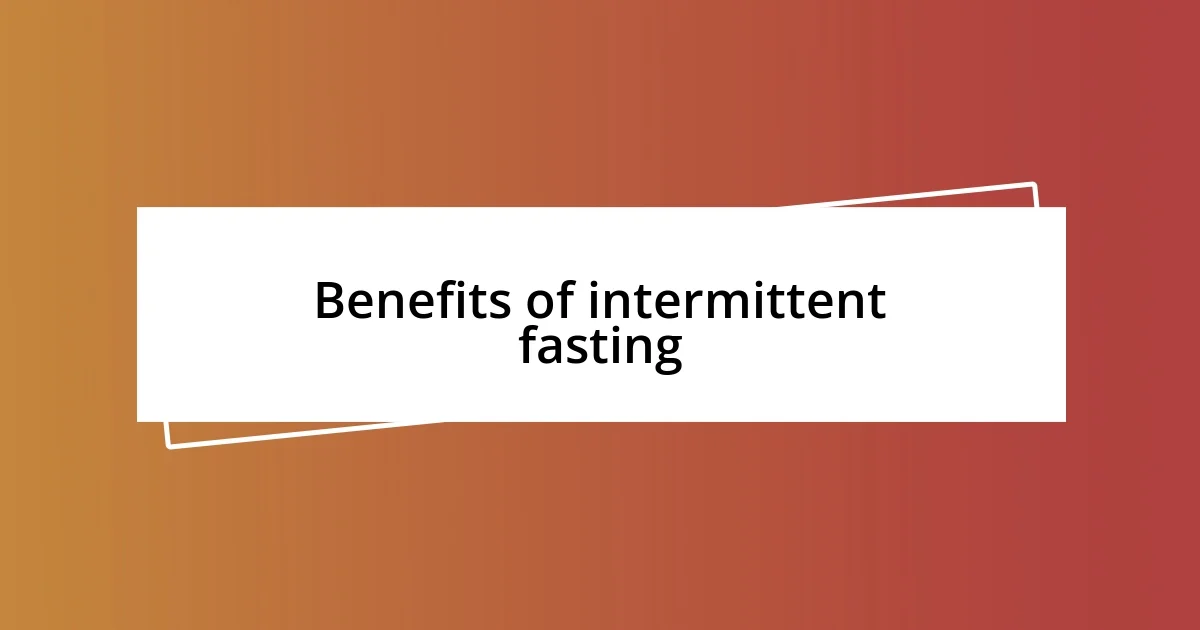
Benefits of intermittent fasting
The benefits of intermittent fasting are both intriguing and impactful. One of the first changes I noticed was improved energy levels throughout the day. Initially, I thought my energy would plummet during fasting hours, but surprisingly, I felt more alert. Those moments of fasting turned into pockets of clarity. My mind was sharper, and I found myself more focused than ever—ever had a moment where everything just clicked for you? That’s the feeling I experienced.
Another significant benefit I experienced was weight management. Intermittent fasting helped me become more mindful about my eating habits. I noticed that when I restricted my eating window, I made healthier choices. This wasn’t just about shedding pounds; it felt like a shift in my perspective on nourishment. It’s as if my body was a temple I became more conscious of, leading me to care for it better.
Lastly, I found that intermittent fasting fostered a deeper connection with my body. Listening to those hunger cues was a journey of self-discovery. I learned to differentiate between emotional hunger and true hunger—a realization that transformed my relationship with food. Wouldn’t it be amazing to truly understand what our bodies need? By embracing fasting, I felt empowered to make better choices and reconnect with my natural rhythms.
| Benefit | Description |
|---|---|
| Increased Energy | Improved alertness and mental clarity during fasting periods. |
| Weight Management | Encourages healthier eating habits and mindful food choices. |
| Enhanced Body Awareness | Strengthens the connection with hunger cues and bodily needs. |
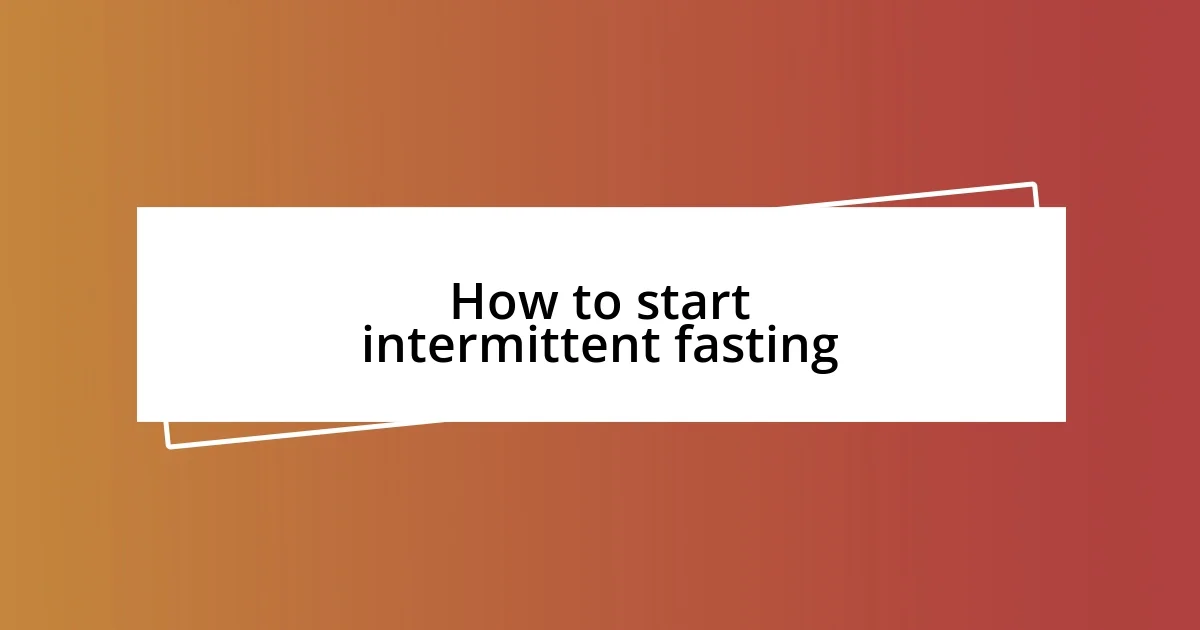
How to start intermittent fasting
Starting intermittent fasting can feel a bit daunting at first, but I found it really straightforward once I broke it down. The key is to choose an eating schedule that aligns with your lifestyle. One approach that worked for me was the 16:8 method, where I fasted for 16 hours and spent 8 hours eating. It was eye-opening to realize that I could easily skip breakfast and still feel satisfied.
Here’s a simple way to ease into it:
- Pick Your Window: Decide which 8-hour eating window feels most natural. For me, it was from noon to 8 PM.
- Hydrate: Stay hydrated during fasting with water, herbal tea, or black coffee. I found sipping on herbal tea helped curb my hunger.
- Listen to Your Body: Start with shorter fasts, then gradually increase the duration. In my case, I began with 12-hour fasts before moving on to 16 hours.
- Prepare Your Meals: Plan your meals ahead to avoid impulsive eating. I began prepping healthy meals for my eating window, ensuring I made the most of it.
- Stay Active: Incorporate light workouts or walks, especially during fasting periods. My energy levels soared, making exercise feel more enjoyable rather than exhausting.
Embracing this journey wasn’t just about the physical aspect; it was a mental transformation too. Initially, I felt anxious about food choices, but as I began to embrace the rhythm of fasting, I noticed a shift. It became less about strict rules and more about nurturing my body and mind. Those early mornings when I felt a twinge of hunger turned into moments of empowerment instead of frustration. It’s incredible how adjusting our eating patterns can lead to deeper self-awareness.
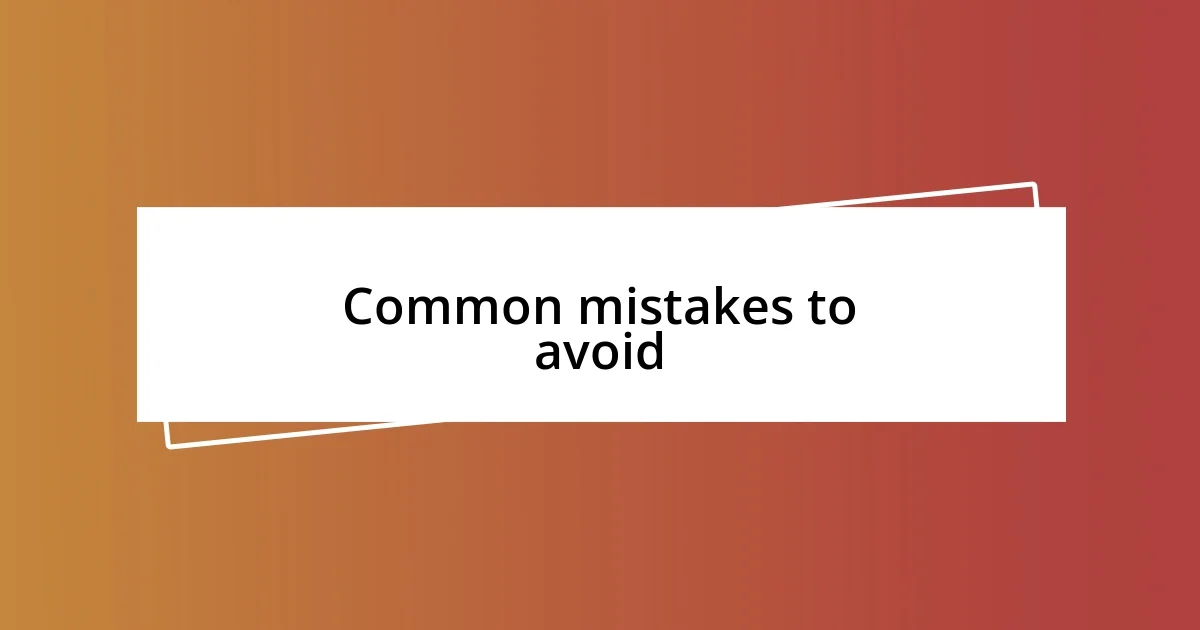
Common mistakes to avoid
One common mistake I learned to avoid is underestimating the importance of hydration during fasting. In the beginning, I often confused hunger pangs for thirst, which left me feeling more deprived than necessary. Trust me, sipping water or herbal tea can transform those tense moments. Have you ever felt like your body just needed a little TLC? That’s what hydration does for me.
Another error I see many people make is overindulgence during eating windows. Initially, I thought, “Finally, time to feast!” and ended up consuming too many calories, which counteracted the benefits I was aiming for. It really struck me that intermittent fasting isn’t a license to binge; it’s about making mindful choices. How about you—do you gravitate towards healthier options when you know your eating window is limited?
Lastly, skipping meals on fasting days was a pitfall for me. I once tried to cram too much into a short window, which left me feeling bloated and uncomfortable. I soon realized that balance is crucial. Eating nutrient-dense foods while being intentional about portion sizes helped me maintain energy without feeling sluggish. Can you imagine the freedom in enjoying your meals and still feeling energized? That shift in mindset not only improved my relationship with food but also my overall well-being.
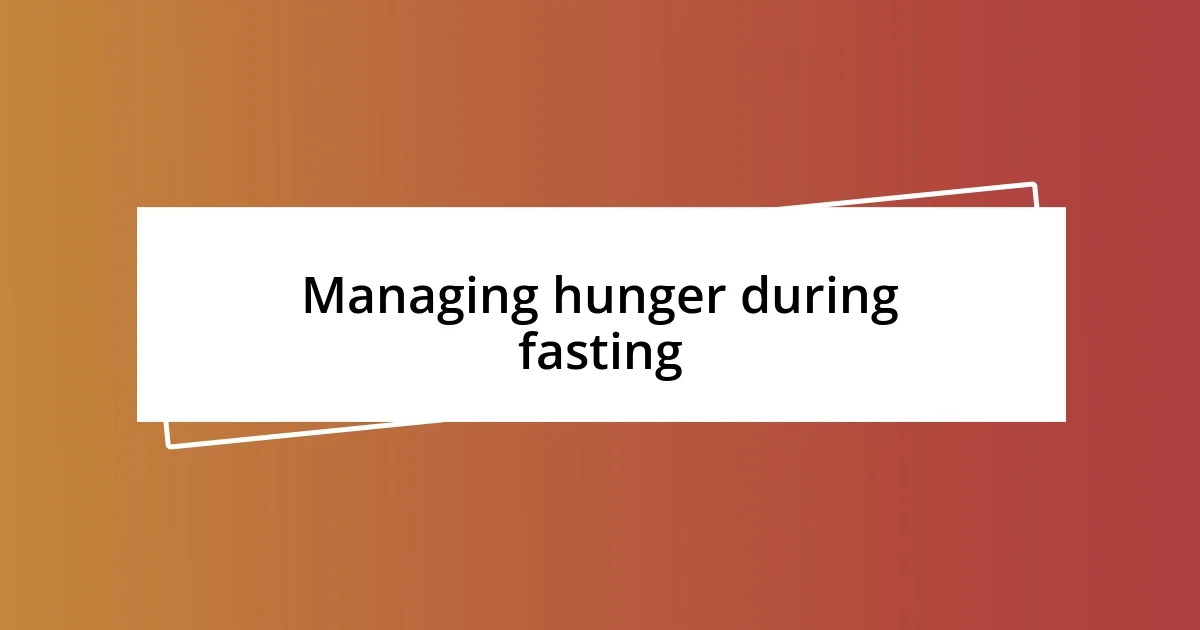
Managing hunger during fasting
Managing hunger during fasting can often feel like walking a tightrope, but I’ve found some effective strategies along the way. One day, as I was facing a particularly tough afternoon, I discovered that distraction was key. Engaging in a hobby or even going for a walk helped me drift away from those gnawing hunger signals. Have you ever noticed how time flies when you’re fully immersed in something interesting?
On particularly hungry days, I turned to mindful practices. During my fasting windows, I began to practice deep breathing exercises. I’d take a moment to sit quietly, focus on my breath, and acknowledge my hunger without judgment. This practice transformed my perspective; instead of seeing hunger as a nuisance, I started to view it as a natural occurrence, a reminder of my body’s resilience. Isn’t it remarkable how our minds can twist discomfort into something empowering?
Interestingly, I also learned that my hunger levels aren’t always about physical need. Sometimes, I caught myself wanting to snack out of boredom or stress. Recognizing this lightbulb moment felt liberating. By keeping busy and respecting my hunger, I developed a healthier relationship with food, and those moments of cravings became more manageable. Have you ever realized that the craving for food sometimes has more to do with emotions than with actual hunger? It’s an eye-opening experience that can redefine how we view our eating habits.
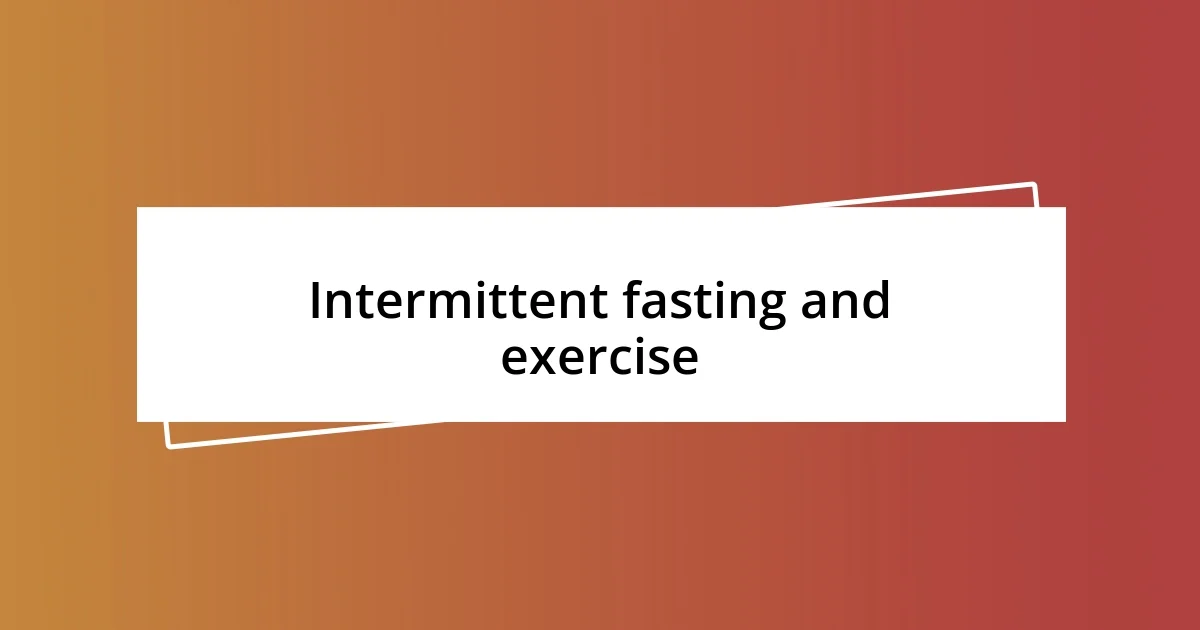
Intermittent fasting and exercise
Exercise while practicing intermittent fasting has taught me a lot about my body’s performance and energy. Initially, I was concerned about working out on an empty stomach. Yet, to my surprise, once I got used to it, I found that I could reach higher energy levels during my workouts. Have you ever had a breakthrough where you realized you were stronger than you thought? Exercising in a fasted state often left me feeling lighter and more focused.
During my fasting days, I often plan my workouts to align with my eating window so I can refuel afterward. One evening, after a rigorous session of weight training, I dove into a nutrient-rich meal, and it felt incredible to nourish my muscles. I noticed that this alignment not only gave me the energy boost I craved post-exercise but also transformed my recovery—less soreness and quicker rejuvenation. Isn’t it fascinating how timing can play such a critical role in our fitness journeys?
I also experimented with different types of workouts while fasting. Some days, a gentle yoga session felt perfect, allowing me to stretch and align my body without the heaviness of a full meal beforehand. On others, I tackled high-intensity interval training (HIIT) and found that the adrenaline and endorphins made me forget about hunger altogether. Have you ever experienced that rush where you lose track of time and hunger? It’s moments like these that have reshaped my perspective on both exercise and fasting, proving that balance and adaptability are key.
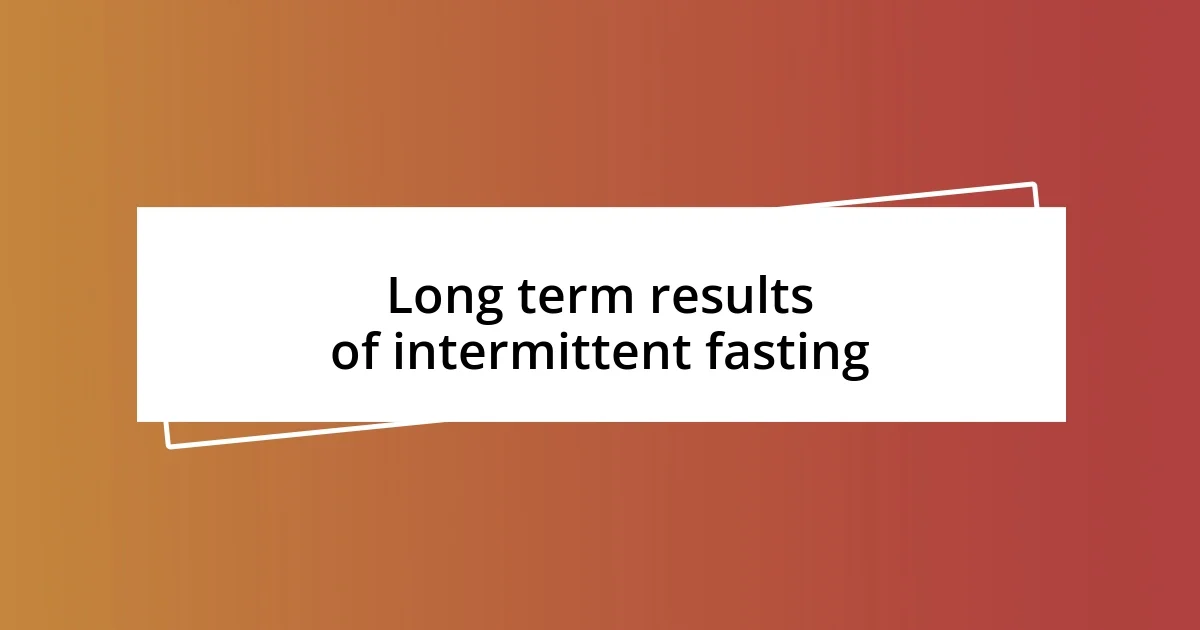
Long term results of intermittent fasting
Long-term intermittent fasting has dramatically changed my relationship with food and my body. Over time, I noticed a significant reduction in my cravings for sugary snacks that used to dominate my day. Instead of relying on constant snacking for energy, I found a newfound appreciation for whole meals, rich in nutrients. Have you ever thought about what you truly need versus what you want? This shift helped me adopt a more balanced approach to nutrition.
As I continued with intermittent fasting, I keenly felt the boost in my mental clarity. It’s fascinating how our brains can become foggy when we’re constantly digesting food. I remember one afternoon, after a long fasting period, everything seemed sharper. It was as if a veil had lifted, allowing me to tackle tasks with heightened focus. Have you experienced something similar where fasting opened new avenues in your daily productivity?
Looking back, the long-term benefits extend beyond my physical health. I’ve become more in tune with my hunger cues and emotional triggers. There were moments when I caught myself mindlessly eating out of habit, and recognizing this was enlightening. It felt like a curtain had lifted, revealing a deeper understanding of my body’s needs. Isn’t it incredible how a simple dietary change can ripple through other areas of our lives, fostering a path of self-discovery and mindfulness?












